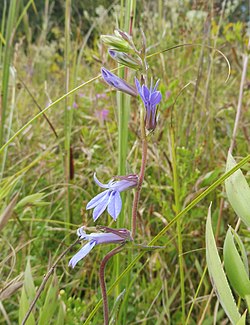From Wikipedia
Open on Wikipedia
| Lobelia puberula | |
|---|---|

| |
| Scientific classification | |
| Kingdom: | Plantae |
| Clade: | Tracheophytes |
| Clade: | Angiosperms |
| Clade: | Eudicots |
| Clade: | Asterids |
| Order: | Asterales |
| Family: | Campanulaceae |
| Genus: | Lobelia |
| Species: | L. puberula
|
| Binomial name | |
| Lobelia puberula | |
Lobelia puberula, or downy lobelia, is a perennial herbaceous wildflower in the Bellflower family (Campanulaceae) native to eastern and south central United States.[1] It is the most common blue-flowered Lobelia in the Southeast.[2] It grows in mesic (moderate moisture) to hydric (moist) habitats in sun or partial shade.[3][4]
Description
[edit]Downy lobelia is a perennial herb that grows up to 2.5 ft (1 m) tall. Leaves are simple with a toothed margin. The flowers are blue to violet, five-lobed, and bloom from July to October.[5]
Lobelia puberula is similar to two other Lobelia species in to the Eastern United States, Lobelia inflata (Indian tobacco) and Lobelia siphilitica (great lobelia); all display the characteristic "lip" petal near the opening of the flower and the "milky" liquid the plant excretes.[6]
References
[edit]- ^ Kartesz, John T. (2014). "Loeblia puberula". County-level distribution map from the North American Plant Atlas (NAPA). Biota of North America Program (BONAP). Retrieved 23 June 2018.
- ^ Spaulding, Dan; Barger, T.Wayne (2016). "Keys, distribution, and taxonomic notes for the Lobelias (Lobelia, Campanulaceae) of Alabama and adjacent states" (PDF). Phytoneuron. 2016–76: 1–60. Retrieved 2018-06-23.
- ^ Missouri Plants
- ^ "Lobelia puberula". Germplasm Resources Information Network. Agricultural Research Service, United States Department of Agriculture. Retrieved 21 January 2018.
- ^ North Carolina Wildflowers
- ^ Caruso, C. M.; Peterson, S. B.; Ridley, C. E. (2003), "Natural selection on floral traits of Lobelia (Lobeliaceae): spatial and temporal variation", American Journal of Botany, 90 (9): 1333–40, doi:10.3732/ajb.90.9.1333, PMID 21659233